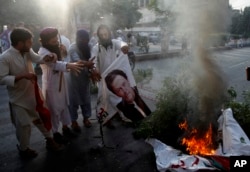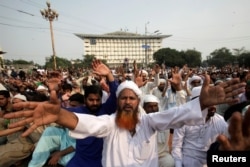The Pakistani attorney who helped a Christian woman overturn her death sentence for blasphemy charges against Islam's holy prophet said Saturday that he fled Pakistan because he feared for his life after her acquittal earlier this week caused widespread protests by Islamists.
Members of the militant Islamist group Tehreek e-Labbaik ya Rasool Allah (TLYR) blocked main roads in Pakistan's largest cites for three days, demanding the deaths of the Supreme Court judges who acquitted Asia Bibi on Wednesday.
Saiful Mulook represented the mother of five, who has been on death row since 2010. Two politicians who had tried to help her were assassinated.
Mulook told Reuters in a WhatsApp message he had gone to another country "just to save [my] life from [an] angry mob" and because of fears for the safety of his family. "I consulted and everybody is of this opinion [that I should leave]."
He added that he would return to the country to continue his work on the case if he was given protection by security forces.
Mulook's departure from Pakistan came after a Pakistan government team negotiated a deal late Friday with Islamist groups, ending the crippling protests.
The government agreed under the deal to take "legal measures" to prevent the woman from leaving the country while the court hears a petition against the verdict.
The protests started Wednesday morning after the highest court in the country upheld Bibi's appeal against a guilty verdict. She was convicted in 2010 under Pakistan's controversial blasphemy laws.
According to Bibi, she was falsely accused after a heated argument with other women who refused to drink water she had given them because she was Christian.
Other religious groups also held demonstrations Friday, albeit peacefully.
The government banned television coverage of protests linked to the issue and suspended cellphone service in several cities throughout the day to contain the crowds.
Schools across the country were closed and many workers stayed home. Traffic was light and unpredictable, with roads blocked either by TLYR members or the police in some places.
People were forced to turn to Twitter, Facebook and other social media forums as news on Pakistan's dozens of television channels was scant, leading to rumors and unconfirmed reports that caused anxiety among those who had relatives or friends traveling or were stuck away from home.
Media, including foreign journalists, often used cellphones rather than cameras to acquire footage of the demonstrations after several instances of TLYR members beating up cameramen or breaking their equipment.






